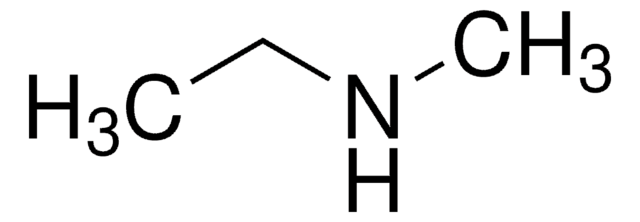295280
Dimethylamine
anhydrous, ≥99%
Synonym(s):
N,N-Dimethylamine
About This Item
Recommended Products
grade
anhydrous
Quality Level
vapor density
1.55 (15 °C, vs air)
vapor pressure
1277 mmHg ( 20 °C)
Assay
≥99%
form
gas
liquid
autoignition temp.
753 °F
expl. lim.
14.4 %
bp
7 °C (lit.)
mp
−93 °C (lit.)
density
0.68 g/mL at 20 °C (lit.)
SMILES string
CNC
InChI
1S/C2H7N/c1-3-2/h3H,1-2H3
InChI key
ROSDSFDQCJNGOL-UHFFFAOYSA-N
Looking for similar products? Visit Product Comparison Guide
Application
- In the preparation of 1-organyl-1-(trimethylsiloxy)-2-(dimethylamino)ethenes starting from α-bromo ketones.
- In one of the key synthetic steps for the preparation of 1-methoxycarbonylpyrrolizin-3-one and its associated compounds.
- Ni-catalyzed cross-electrophile coupling of Katritzky pyridinium salts with bromoalkanes through C-N bond activation.
- To synthesize tertiary amides which on reaction with Petasis reagent followed by bromination forms bromomethyl ketones.
Packaging
Compatible with the following:
Legal Information
also commonly purchased with this product
hose barb
recommended
regulator
Signal Word
Danger
Hazard Statements
Precautionary Statements
Hazard Classifications
Acute Tox. 4 Inhalation - Aquatic Chronic 3 - Eye Dam. 1 - Flam. Gas 1A - Press. Gas Liquefied gas - Skin Irrit. 2 - STOT SE 3
Target Organs
Respiratory system
Supplementary Hazards
Storage Class Code
2A - Gases
WGK
WGK 1
Flash Point(F)
19.9 °F - closed cup
Flash Point(C)
-6.7 °C - closed cup
Personal Protective Equipment
Regulatory Listings
Regulatory Listings are mainly provided for chemical products. Only limited information can be provided here for non-chemical products. No entry means none of the components are listed. It is the user’s obligation to ensure the safe and legal use of the product.
PDSCL
Deleterious substance
PRTR
Class I Designated Chemical Substances
ISHL Indicated Name
Substances Subject to be Indicated Names
ISHL Notified Names
Substances Subject to be Notified Names
JAN Code
295280-BULK:
295280-PZ:
295280-VAR:
295280-1KG:4548173131276
295280-400G:4548173131283
295280-100G:4548173131269
Choose from one of the most recent versions:
Already Own This Product?
Find documentation for the products that you have recently purchased in the Document Library.
Our team of scientists has experience in all areas of research including Life Science, Material Science, Chemical Synthesis, Chromatography, Analytical and many others.
Contact Technical Service







